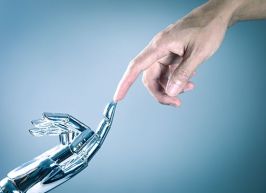Robots are already changing life and work. Each new change, from automated care in nursing homes to self-driving taxis, sex robots, and drone warfare, presents new moral challenges. How much privacy to surrender? How many human workers should robots replace? Should machines perform surgery, process loan applications, supervise children, and fight wars on our behalf? Belgian philosopher Mark Coeckelbergh examines these and other questions, concluding that the real question is, what kind of future do we want for our children?
Robots are already changing the world; humans must consider whether those changes are desirable.
The dangers robots present to people are not primarily science fiction scenarios where sentient machines revolt against humanity. Robots are changing the world, but in more mundane ways: altering how people work, travel, interact with one another, and more. And the issues they create are more subtle: job losses, negative psychological effects, and invasions of privacy. The ethics of their use is, therefore, of the utmost importance. Used incorrectly, this technology can deepen economic disparities, harm groups with special vulnerabilities, and lead to the loss of human life and dignity.
Inquiries into the ethical dilemmas relating to robotics must include the question of who holds responsibility for the problematic effects of this new technology. An automaton can make decisions, but it is still just a tool that cannot bear the blame when it causes harm. Who, then? The user? The manufacturer? The programmer? The marketer? Some regulatory agency? Robots present new ethical...
Mark Coeckelbergh is a Belgian philosopher of technology, professor of philosophy of media and technology at the University of Vienna, and author of several books including New Romantic Cyborgs.


















Comment on this summary or 开始讨论